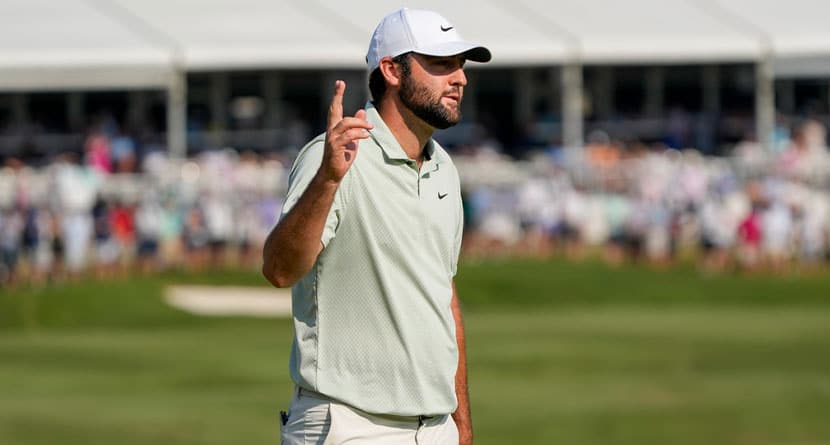CASTLE ROCK, Colo. (AP) — The “silly” notion that Scottie Scheffler could have won two playoff events and still not capture the FedEx Cup after a dominant season is nothing new.
Go back 15 years to find Tiger Woods deciding to play the postseason opener for the first time, a big boost in the third edition of the FedEx Cup playoffs. It was only during the pro-am at Liberty National when he realized he could win every playoff event and still lose out on the season title if he didn’t have a good week at East Lake.
Woods was more diplomatic about the points system in his press conference — “It is different, there’s no doubt,” he said — than he was when talking about it away from microphones on the course.
But it had a happy ending for him. Woods won the BMW Championship, finished second to Phil Mickelson (the No. 14 seed) at the Tour Championship and won the FedEx Cup.
The system has been tweaked since then, but the philosophy is the same.
It’s a case of pick your poison.
The PGA Tour could keep score for the entire season and run the risk of no drama at the final event, even with greater emphasis on the playoff events. Or it could have it come down to the last week with any number of possibilities.
Scheffler, much like Woods in 2009, would fit into that first category. He not only has six victories — the Masters, The Players Championship and four signature events — he has finished out of the top 10 just twice this year.
All that, and it still comes down to East Lake.
“I think it’s silly. You can’t call it a season-long race and have it come down to one tournament,” Scheffler said last week.
This wasn’t a new revelation, from Scheffler or anyone else. Jon Rahm and Patrick Cantlay in recent years have expressed the same, followed by the standard, “It is what it is.”
Scheffler’s choice of the word “silly” made for easy headlines. But he also acknowledged that under a different format, someone could have the FedEx Cup all wrapped up before the Tour Championship.
“That’s not good, either,” he said. “It would be great for me, but those aren’t the rules.”
The rules allow for a big finish. That would be someone like Billy Horschel, who didn’t contend at a single tournament in 2014, got hot when the calendar turned to August, won the last two events and won the FedEx Cup.
Dramatic stuff, sure. But the best year belonged to Rory McIlroy.
It’s not about the new strokes differential system in place since 2019. The top seed starts the Tour Championship at 10-under par with a two-shot lead, while the players who barely make it to East Lake start 10 shots behind. That’s not different from when the points were reset; the odds are roughly the same.
It still comes down to one week.
What gets lost is understanding what the FedEx Cup is and has always been — a bonus competition at the end of the year that delivers the best fields and great tournaments. It also pays handsomely, a prize now up to $25 million.
It’s important to players. It’s meaningful. But it doesn’t define a great season. Scheffler’s year will not be looked upon any worse if he’s watching someone else — Viktor Hovland last year, McIlroy the year before — cashing in at East Lake.
The tour tried to make amends with the “Comcast Business Top 10” to reward the regular season. Scheffler won in a landslide and earned an $8 million bonus. But no one ever talks about who won that title.
One solution might be a computer formula that determines the size of the lead going into the Tour Championship that reflects a player’s performance. Scheffler could start the Tour Championship with a four-shot lead, for example, after a season like this one.
Then again, Scheffler had a six-shot lead going into the final round in 2022 and still couldn’t win. McIlroy captured his third FedEx Cup title that year. McIlroy has never won a FedEx Cup from the pole position.
As one can imagine, he has no gripes with the system. McIlroy is not being entirely selfish.
“I think it makes the Tour Championship more exciting from a consumer standpoint,” he said. “Is it the fairest reflection of who’s been the best player of the year? Probably not. But I think at this point, we’re not in for totally fair, we’re in for entertainment and for trying to put on the best product we possibly can.”
If there’s anything that needs a closer look, it’s the schedule.
McIlroy, the No. 3 seed to start the postseason, finished second-to-last at the FedEx St. Jude Invitational last week. The heat was stifling, and McIlroy was playing tennis after his first round. So much for conserving energy during the playoffs.
His tie for 68th against a 70-man field sent him to No. 5 in the standings. Don’t be surprised if McIlroy or another top seed skips the first playoff event next year because it has so little bearing on them in the big picture.
It would help to rotate the opening event. Of course, there’s the issue of that big building next to the fifth hole at the TPC Southwind — FedEx headquarters. It’s a big bill FedEx is paying. The tour is no longer in New York or Boston. That should be considered.
There was talk a few years ago about rotating the Tour Championship, using East Lake as an anchor site every other year. But with the FedEx Cup in its 18th year, players now say “East Lake” as where they want to be at the end of the year.
In the meantime, no system is perfect. And no practical solutions have been presented. The only thing “silly” about the FedEx Cup is the amount of cash on the line.




